-SIR FELIX SCHUSTER AND THE INDIA OFFICE DEPOSITS.
[To THE EDITOR OP THE "SPECTATOR."] ,Slae.4 see that in the Spectator and elsewhere it continues to be suggested that Sir Felix Schuster, as Governor of the :Union of London and Smiths' Bank, ought not to have placed with that bank so large a share as he did of the India Office deposits, of which, in his other capacity as chairman of the Finance Committee of the Secretary of State's Council, he was able to influence the disposal. It will surely not be contended that, so long as other approved banks also had a due proportion, Sir F. Schuster should have placed none of this money with the bank of which he is Governor. It was surely not his duty to deny to his own bank its well-deserved place in the first rank of London banks. It is, however, material to know what proportion of these deposits was placed with the Union Bank before and after Sir F. Schuster became chairman of the Secretary of State's Finance Committee. Being a Director of the Union of London and Smiths' Bank, I have the best reason for knowing that their proportion became thereafter not larger but much smaller. Sir F. Schuster became Chairman in 1911—I believe, in August. He found the Union of London and Smiths' Bank sharing these India Office deposits with two other banks. He proceeded at once to make them sharers with six instead of two. The pecuniary effect was that the maximum amount of India Office money deposited with Sir F. Schuster's bank during the year ended November 6th, 1912, was stated by the India Office, in answer to a question in Parliament, to have been £1,250,000, or less by 60 per cent. than the 23,050,000 mentioned by the Spectator, which was the amount on deposit with them on June 8th, 1911. I write without Sir F. Schuster's knowledge. But that leaves me free to say that I cannot understand why, in fairness to their own Counoillor, the India Office have not brought out these facts when questions in Parliament gave them the opportunity.—I am, Sir, &c., [We made no imputation against Sir Felix Schuster, and we are sure he had no intention of exploiting his position at the India Office to help his bank or one of his customers. We hold it, however, to be most undesirable that the head of a great London bank should also hold a position at the India Office which makes him the dispenser of India Office financial favours. The system was, of course, not invented by Sir Felix Schuster, nor can we blame him for accepting the post he holds. We blame, however, the system, and are astonished it should ever have been devised. Unfortunately, it cannot be got rid of without plain speaking.—En. Spectator.]






































































 Previous page
Previous page